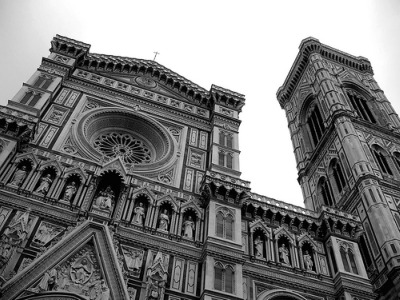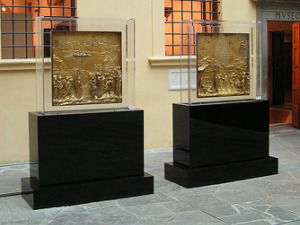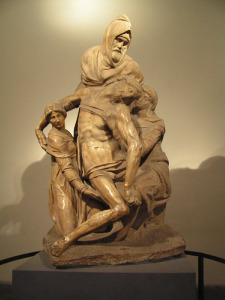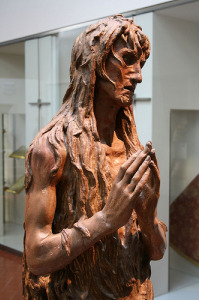 There are two things you should know about visiting Florence’s Museo dell’Opera del Duomo right from the start. First of all, this museum has nothing – I repeat, nothing – to do with opera music. The word “opera” in this case refers to “artworks.” Second, it’s where you’ll need to go to see all the artwork that once decorated the interior of the Florence Duomo. So if you walk through the Duomo and wonder why it’s so empty, it’s because nearly everything is now in the museum behind the church.
There are two things you should know about visiting Florence’s Museo dell’Opera del Duomo right from the start. First of all, this museum has nothing – I repeat, nothing – to do with opera music. The word “opera” in this case refers to “artworks.” Second, it’s where you’ll need to go to see all the artwork that once decorated the interior of the Florence Duomo. So if you walk through the Duomo and wonder why it’s so empty, it’s because nearly everything is now in the museum behind the church.
You can, of course, enjoy a visit the Duomo without ever wondering where all the “stuff” is, but if you know anything about Italian churches it’s that they’re typically excellent places to see world-class artwork on display “in situ.” In Florence, however, after the disastrous flood of 1966, when many of the Duomo’s artwork was damaged or destroyed, the pieces that remained were removed, restored, and then moved to a museum space in a building behind the Duomo itself. The bummer here is that churches throughout Italy are usually free, meaning you get to see all that amazing artwork without paying admission. In Florence, after your free stroll through the Duomo, you’ll need to buy a ticket to see the artwork that once adorned the church’s interior.
 Easily the best reason to fork over the entrance fee at the Duomo Museum, however, is to get a look at the original panels from Ghiberti’s “gates of paradise” – which, if you’ve been paying attention, are on the Florence Baptistery, not the Duomo. The famous doors on the Baptistery itself now are replicas (and darn good ones), but to see the originals (which were damaged in the flood) you’ll need to go to the Duomo Museum. They’re enclosed in protective cases now, but you can usually get a much closer look at them then you can at the replica doors, which are often blocked by crowds. More interestingly, perhaps, is that you can check out the panels from the side, so you can see just how much depth Ghiberti managed to capture in such a small piece of bronze.
Easily the best reason to fork over the entrance fee at the Duomo Museum, however, is to get a look at the original panels from Ghiberti’s “gates of paradise” – which, if you’ve been paying attention, are on the Florence Baptistery, not the Duomo. The famous doors on the Baptistery itself now are replicas (and darn good ones), but to see the originals (which were damaged in the flood) you’ll need to go to the Duomo Museum. They’re enclosed in protective cases now, but you can usually get a much closer look at them then you can at the replica doors, which are often blocked by crowds. More interestingly, perhaps, is that you can check out the panels from the side, so you can see just how much depth Ghiberti managed to capture in such a small piece of bronze.
 Another highlight of a visit to the Duomo Museum is a Michelangelo Pieta – but not the one you’re probably familiar with. Michelangelo’s most famous Pieta sculpture is in St. Peter’s Basilica in Vatican City behind bullet-proof glass, but the Pieta that’s tucked into a stairwell niche in Florence’s Duomo Museum is notable for a couple of reasons. It’s mostly unpolished, so you can still see the markings left by carving tools (which I think is particularly interesting). But beyond that, one of the figures (Nicodemus) is a self-portrait of Michelangelo himself.
Another highlight of a visit to the Duomo Museum is a Michelangelo Pieta – but not the one you’re probably familiar with. Michelangelo’s most famous Pieta sculpture is in St. Peter’s Basilica in Vatican City behind bullet-proof glass, but the Pieta that’s tucked into a stairwell niche in Florence’s Duomo Museum is notable for a couple of reasons. It’s mostly unpolished, so you can still see the markings left by carving tools (which I think is particularly interesting). But beyond that, one of the figures (Nicodemus) is a self-portrait of Michelangelo himself.
 One of the most memorable pieces from my visit to the Museo dell’Opera del Duomo was Donatello’s wooden sculpture of Mary Magdalene – she looks truly horrible, but at the same time peaceful. Her long and matted hair blends so well with her torn dress that it looks as if she’s clothed in hair, and her thin arms and face are evidence of her poverty – yet her hands are raised in prayer, and one gets the impression that the point isn’t to emphasize her ugliness but instead her faith.
One of the most memorable pieces from my visit to the Museo dell’Opera del Duomo was Donatello’s wooden sculpture of Mary Magdalene – she looks truly horrible, but at the same time peaceful. Her long and matted hair blends so well with her torn dress that it looks as if she’s clothed in hair, and her thin arms and face are evidence of her poverty – yet her hands are raised in prayer, and one gets the impression that the point isn’t to emphasize her ugliness but instead her faith.
Other works on display at the Museum include more Donatello carvings, the death mask of Brunelleschi (the architect of the Duomo’s fantastic dome), some of the equipment Brunelleschi used to build the revolutionary dome on the cathedral, and two 15th century choir lofts from which the Duomo’s choir used to sing (one of them is by Donatello).
Unfortunately, the Museum’s official website is decidedly less than helpful if you’re looking for visitor information like when it’s open and how much it costs; but if you’re just curious about the history of the museum or what’s on display, it’s perfectly fine.
>> For more itinerary ideas, have a look through this more complete list of what to do in Florence.
photos, top to bottom, by yeowatzup, manelzaera, manelzaera, pmorgan67